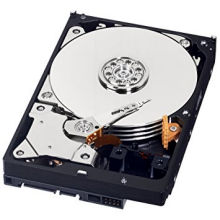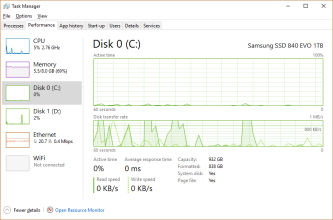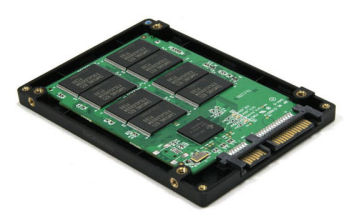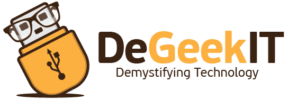Hard Disks and Solid State Drives
So we’ve already identified the RAM as being the equivalent of your brain’s short term memory. Well to stick with the analogy, a Hard Disks (HDD) are the long-term memory.
What are hard disks?

A typical hard disk is an extrapolation of designs that date back over 60 years! You can think of it like an old turntable (record player), with a double-sided disk, with needle and arm on either side of the disk. However, there are always multiple disks (platters) and two heads per platter (one for each side). Instead of grooves and a needle, they are magnetic (like an old tape recorder) and as such are susceptible to being wiped by magnetic fields.
They are mechanical devices and while each platter spins, the head very rapidly moves backwards and forwards from place to place on the platter (it doesn’t just sequentially move from the outside towards the inside). That’s why you sometimes here a spinning noise and a rattling noise inside your machine. When parts of the hard disk starts to fail, you’ll sometimes hear clicking noises as the head tries to read a part of the disk which is damaged.
What could possibly go wrong?
Hard disks DO die. They have a limited life span and some last much longer than others. They’re very susceptible to bangs and knocks, extreme temperatures (inside your computer) and the amount they are read from and written to will influence how long they last.
Since hard disk do not last for ever, and I’ll say it again… they DO die, and they store all of your data (photos, music, videos, documents… everything), it is crucial to keep backups. How frequently you back up your data depends on how frequently you write new data to the disk.
They also slow down over time depending on how full they are and how the data that is written to them is arranged. Remember that I said that they do not read data in a sequential spiral like an old vinyl? Well that’s true: they can randomly move the head to any track anywhere on the disk in any order. However, moving the head from the outside of the platter to the inside of the platter to the inside takes a small, but measurable amount of time.
The more the head has to move to open a file or application, the slower it will load. As the disk gets fuller, data on it gets more and more fragmented across the platters of the disk drive. This causes ever increasing slow down and a partial temporary way to mitigate the problem for a while is to defragment the disk (modern operating systems sometimes do this automatically from time to time).

Your computer will dramatically slow down if it is “swapping” a lot (due to insufficient RAM), to a fragmented page file. The page file is an area on the hard disks reserved for RAM offload.
Bring on the Solid State Drives (SSD)!

Thankfully, in recent years, there has been a revolution in long term storage. Mechanical Hard Disks have been superseded by Solid State Drives (SSD). A Solid State Drive is much more akin to the little SD card you might have in your digital camera. It contains no moving parts and even a cheap one is typically at least 10 times as fast as a hard disk drive.
High capacity SSDs are still quite expensive compared to HDDs, so sometimes desktop computers come with both a small SSD and large HDD (or a drive that combines both).
If your HDD is constantly rattling away or running near its maximum transfer rate, you will inevitably have a slow computer. Occasionally you can find the process that is causing the constant activity and shut it down or lower its priority. Sometimes it’s a crucial activity but it is not unusual to have a malicious hidden piece of malware such as a virus rattling away in the background. It’s important to identify the cause before choosing a solution.
Should I replace my Hard Disks?
Replacing a painfully slow HDD with a fast SSD in an ageing computer is often a relatively easy task. In most cases will make a very dramatic (and cost effective) improvement in your computer speed. It will improve both the boot up time of your computer and how it performs while you are using it.
Buying a new computer without an SSD is highly inadvisable these days. Unfortunately, computer stores will still palm off machines to the unknowing shopper. Keep an eye out for SSD or HDD labels and avoid any machine that only has an HDD.
DeGeekIT can help you identify the root of your computer performance problems and help you identify the best solution. If you do need to buy a new computer or component, talk to us first and find out what’s best for your needs. Empower yourself! Spending a bit of time and money with DeGeekIT will help prevent you from wasting money on poor computer purchases! Contact us today!
Book Appointment